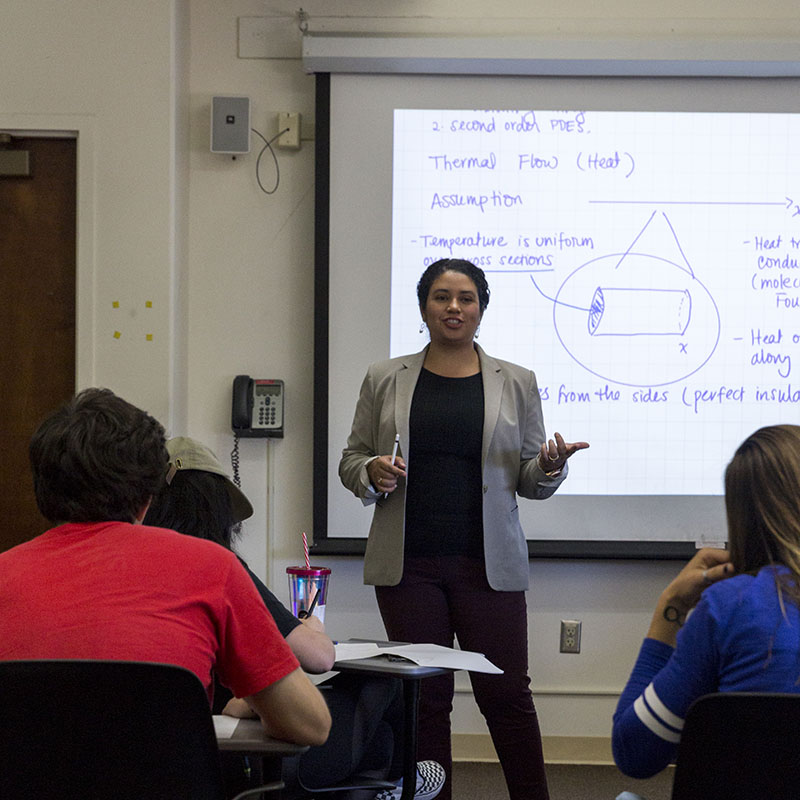 Sept. 12, 2019 — CSU Channel Islands (CSUCI) Assistant Professor of Mathematics Cynthia Flores, Ph.D., is proud to have been a PUMPkin, and thanks to a grant from the National Science Foundation, she can now welcome other PUMPkins.
Sept. 12, 2019 — CSU Channel Islands (CSUCI) Assistant Professor of Mathematics Cynthia Flores, Ph.D., is proud to have been a PUMPkin, and thanks to a grant from the National Science Foundation, she can now welcome other PUMPkins.
PUMP is short for “Undergraduate Research Groups in the CSU Alliance for PUMP: Preparing Undergraduates through Mentoring toward PhDs,” a project that has been in the CSU system for 10 years.
The PUMP program and other science, technology, engineering and mathematics (STEM) programs at CSUCI recently got a boost from a new grant from the National Science Foundation (NSF) and a continuing grant from the U.S. Department of Education.
The PUMP grant is a collaborative grant with San Jose State University (SJSU) at the helm. The PUMP program has been in existence for more than 10 years and is in the process of becoming a system-wide resource for students in the 23-campus CSU system, including CSUCI.
Flores received $18,673 toward CSUCI’s PUMP program, which is designed to increase the number of minority students pursuing advanced degrees in Mathematics. A 2015-2016 annual survey of mathematics doctoral recipients conducted by the American Mathematical Society showed that out of 1,921 PhD recipients, 942 were white, 780 were Asian, 92 were Hispanic and 53 were African American.
PUMP scholarships will be open to 40 math undergraduates at any of the 23 CSU campuses, including CSUCI. At any campus with PUMP students, mentors like Flores will strive to create a welcoming Mathematics community of minority students not usually well-represented in the field.
“Their struggles are more on the social side than on the mathematics content,” Flores said. “We will participate in challenging math activities beyond the typical undergraduate curriculum. We will do undergraduate research as well as intense summer math workshops designed to help them be successful in a Ph.D. mathematics program.”
The community calls themselves PUMPkins—one more way to develop cohesion among math undergrads who may be the first in their family to attend college.
“I was a PUMP student. I was low income, first generation minority Hispanic,” Flores said. “Everyone who is first in their generation to go to college feels a culture shock on campus. Putting PUMPkins together helps them express their jitters at being in a new place and not knowing everyone.”
PUMPkins will be paired up so no one is ever alone. The group can study together and plan their careers, with the community aspect of the project keeping everyone engaged.
“Once we identify these talented students with potential, we take them from where their vision is and show them a vision they didn’t think was accessible to them,” Flores said. “If we meet that goal, they return to the community as a leader and serve as an example.”
Flores co-wrote the grant with CSU San Jose Assistant Professor of Mathematics Jordan Schettler, PhD, who is conducting a PUMP program at CSUSJ during the 2020-21 year along with Flores.
Also strengthening STEM education at CSUCI is the U.S. Department of Education grant for $1,199,994, the fourth installment of a five-year grant in support of a project entitled “Project PROMESAS (Pathways with Regional Outreach and Mathematics Excellence for Student Achievement in STEM).”
The grant was procured by Associate Vice Provost for Student Success & Community Engagement Amanda Quintero, Ph.D.; Professor of Chemistry Phil Hampton, Ph.D. and Professor of Mathematics Cynthia Wyels, Ph.D.
“The goal of Project PROMESAS is to significantly enhance STEM students’ learning and experiences in the calculus pipeline,” Wyels explained.
Faculty from CSUCI, all three Ventura County community colleges and one from Bakersfield College are benefitting from projects made possible by the PROMESAS grant. Pre-calculus and calculus courses are a stumbling block for many students, Wyels explained.
“These are the courses all of our STEM students need to take. Challenges with these courses not only block many students from pursuing STEM majors, but also from graduating.” Wyels said. “We have to change our teaching practices so we can help.”
Wyels’ role is to introduce faculty to a new teaching model for calculus and pre-calculus – one shown by research to enhance the learning of all students, particularly 21st century STEM students, who are rich in diversity.
“We need to have culturally relevant teaching,” Wyels said. “Higher ed was traditionally built for the white male elite, between the age of 18 and 22, and even then, only a small portion succeeded. That no longer describes our student body, so we have to adjust.”
Wyels and the STEM Service Courses Leadership Team engages three mathematics faculty groups in a two-year program of learning and doing. The central themes are building community, creating an atmosphere of active learning as opposed to primarily note-taking, and creating tasks for students that are both challenging and stimulating. The goal is to provide opportunities for all students to succeed in calculus and then in STEM.
